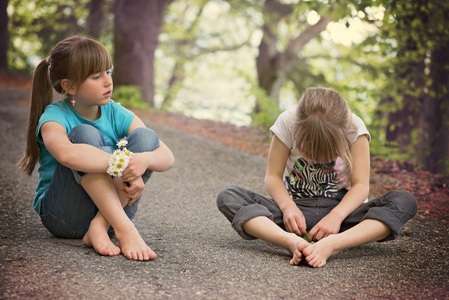Children in particular more forgiving of friends

Parents have little influence over how forgiving a child is towards other children. It also appears that if children think they are special, they are less forgiving. These are the conclusions of research conducted by Reine van der Wal in the context of the NWO (Netherlands Organisation for Scientific Research) Youth and Family programme. She will be awarded a PhDby Radboud University on Friday 26 June.
Behavioural scientist Reine van der Wal from Radboud University's Behaviourial Science Institute examined how forgiving children from 9 to 12 years of age are when dealing with situations such as not being invited to a party, being picked last in gym class or realising a friend has not kept their secret. "I wanted to know what factors could predict how a child would react."
The most logical factor seemed to be the parents. "But they appeared not to play a significant role and not to have any direct influence." By far the most important factor was whether or not the children were friends; if they were friends, the child was much sooner forgiven than if not.
Evolution and forgiveness
Van de Wal attributes the limited influence that parents have in this respect to the fact that forgiveness appears to be an evolved behaviour. "Children have to get along with their contemporaries in order to be happy and healthy. At the same time, hurting each other is unavoidable. One of the biggest challenges in a child's life is maintaining friendships, despite the constantly erupting conflicts that go with them. Forgiveness appears to be a crucial factor in this regard. "It seems to be almost impossible for a child to maintain a friendship for any length of time if it is unable to forgive."
'Special' children less forgiving
In another experiment, Van de Wal looked at how forgiving children were if they felt they were special. Having jotted down some notes on paper about a recent upset, they were divided into groups. Children in the 'special group' were asked to note down a special characteristic about themselves ('I have red hair', 'I can play football'…). A group of 'equals', on the other hand, were asked to note down similarities they shared with other children ('I'm sometimes sad', 'I have two legs'…). The subsequent 'very hurtful event' (e.g. 'you can't come to my party') was forgiven less often by the group of 'special' children than by the others.
Van der Wal: "A comparable experiment carried out among two hundred students provided similar results. Placing too much emphasis on how unique someone is seems to undermine the process of forgiveness and affect interpersonal relationships. This also applies to adults."
Popular boys and girls
According to Van der Wal, forgiveness is something that can be learned; her study also showed that even children who can control their impulses are more forgiving. "Children who can learn to control their impulses perform better at school, but it is likely that this also makes them more sociable. There is still a lot of progress to be made in this respect."


















